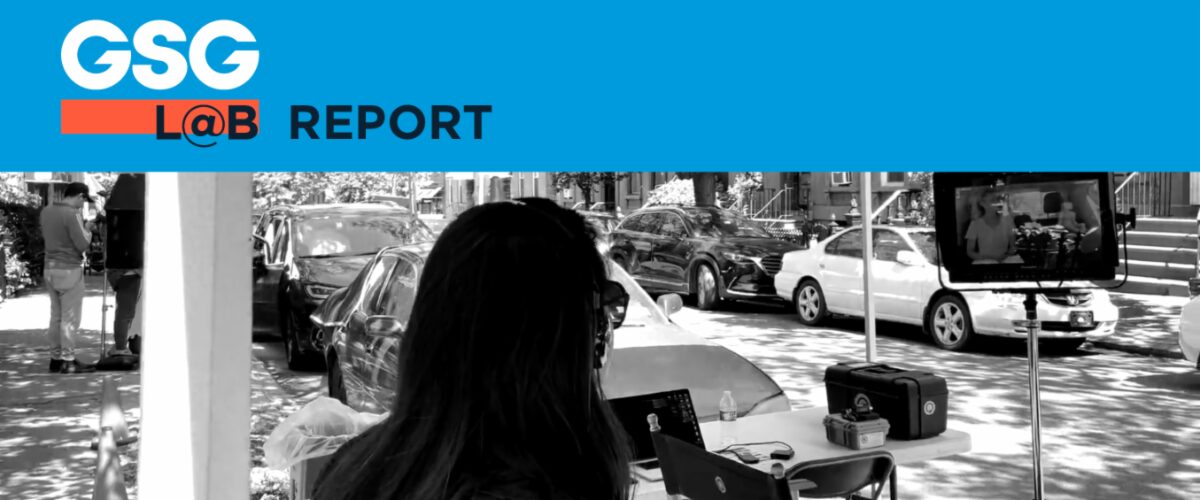
February 8, 2024
Welcome to The L@B Report
Welcome to this month’s issue of The L@B Report from GSG, bringing you news and insights from the intersection of digital media and public affairs. In this issue, we explore the end of cheap, ad-free streaming TV, a deepfake robocall that pretended to be President Joe Biden, and the FTC taking action against a location-data broker for violating a healthcare privacy executive order.
In the News
The Era of Cheap, Ad-Free Streaming TV Is Dead
Amazon Prime started ad-supported streaming in January
When Netflix’s online streaming service started in 2007, folks dreamed of a future ecosystem of cheap, ad-free streaming apps that would directly challenge cable and satellite TV.
Fast forward to 2024 and it appears that dream is partially dead as the Washington Post reported in January that Amazon Prime, one of the last major streaming service to not have an ad-supported tier, began serving ads to subscribers unless they pay more.
Takeaway
In the last year, Netflix, Disney Plus, Hulu, Paramount Plus, Peacock, Apple TV, and ESPN Plus have all raised their prices according to The Verge. And Apple TV is the only one that doesn’t yet have ads – yet being the keyword.
A new report from the Financial Times shows that as little as a year ago, a popular set of streaming services added up to a total cost of $73 per month – compared to $83 for an equivalent cable package. But the latest round of streaming price increases has pushed that cost to $87 – making streaming more expensive than cable.
However, despite the increase in costs, consumers are still “cutting the cord” in record numbers – and streaming services allowing advertisements on their platforms gives marketers and public affairs professionals new ways to reach cord cutters.
Robocall Deepfake of Joe Biden’s Voice Attempted to Suppress the Vote in New Hampshire’s Primary Election
Following the deepfake, the FCC seeks to make AI-generated robocalls illegal
POLITICO reported that the New Hampshire attorney general’s office is investigating a robocall that appears to have spoofed President Joe Biden’s voice and told voters to cast ballots in November instead of the New Hampshire primary election.
While there are currently no federal laws prohibiting the sharing or creation of deepfakes, the Federal Communications Commission is seeking to make AI-generated calls illegal under the Telephone Consumer Protection Act following the deepfake of Biden’s voice.
Takeaway
Experts have expressed anxiety about deepfakes in society – and elections in particular – for years. Recent easy-to-use AI tools have moved these worries from concerns to actual disruption. Before the Biden robocall, AI deepfakes were used in attempts to sway elections in Slovakia and Taiwan.
In addition to disrupting elections, explicit deepfakes of Taylor Swift spread on Twitter/X in late January, renewing calls for lawmakers to take action to regulate AI and deepfakes more broadly.
While Congress debates various laws governing AI and deepfakes, the Federal Elections Commission is also considering rule changes to regulate the use of AI deepfakes in campaign materials. In the meantime, Meta’s new disclaimer for digitally manipulated advertising went into effect in January.
Even if Congress acts, the deepfake genie is out of the bottle as the technology exists now to digitally spoof images, audio, and video at a relatively low cost. Having a crisis communications plan for deepfakes is now a must for organizations.
FTC Bans Company From Selling Data on Medical Visits
First major enforcement on location data since President Biden’s executive order on privacy protections for people seeking an abortion
As reported by POLITICO, the Biden administration banned a company in January from selling data on people’s medical visits. The settlement comes as Americans are concerned about who can see their most sensitive personal data – particularly visits to abortion providers.
After an investigation, the Federal Trade Commission said it had reached an agreement with Outlogic, a location data broker, which had been collecting information on people’s visits to medical centers. While the company didn’t share any data related to abortion clinics, the FTC said Outlogic’s sales regarding visits to medical facilities, pharmacies, and specialty infusion centers were still a significant privacy violation.
Takeaway
The FTC has been cracking down on health privacy violations after the U.S. Supreme Court overturned Roe v. Wade. Shortly after, President Biden issued an executive order directing federal agencies to protect people’s privacy related to health care services.
Privacy advocates are concerned that law enforcement in states that have banned abortion could use location data to prosecute people seeking an abortion. Anti-abortion groups have even used location data to target ads to Planned Parenthood visitors.
With no federal law against selling location data from smartphones, cars, and other connected devices, companies can collect and share people’s whereabouts with advertisers to serve ads related to the places individuals visit. However, Sen. Ron Wyden (D-Ore.) is calling for stronger regulations – especially to prevent the government from buying location data on citizens.
As consumers become more aware of how their location data is being used to target advertising to them, it will be interesting to see if calls for regulation extend beyond healthcare-related spaces.
More From GSG
Same L@B, new look. GSG’s in-house creative agency put their creative brainpower to the test with this latest project — their own website rebrand! Check out our updated site which shows us on location with some of our awesome clients, and learn more our services, our people, and our successes.
And while you’re at it, follow our Instagram page for more updates straight from the L@B team.
This issue of The L@B Report was put together by Ryan Alexander.
Follow us on Instagram for more updates!